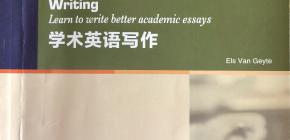Chapter 6 Research and analysis
Part One: Self-evaluation
Let Ss read the list of statements and circle the answer according to their condition.
ü I prefer to decide what my answer to an essay question is while I carry out my research.
ü I know how to identify suitable sources.
ü I feel confident about how to take notes.
ü I know how to decide how much research I need to do and what information is relevant to include.
ü I know how to demonstrate that I can think critically in my writing.
Part Two:On Writing and Discussing in Group
On Question Discussion
What research skills have you grasped so far?
On Writing
ü Start your research after getting your first outline.
ü Search for resources in the library and online to find answers to the specific questions your essay to address.
ü Save time and make the essay more focused.
How to do:
ü Identify reliable resources that cover the specific areas you need to write about
ü Note down the full details of the resources.
ü Read the useful section only.
ü Mae clear notes.
2. Suitable sources
ü Check the sources available before your research.
ü Use online library catalogue.
ü Define the key word and try to find the key word relevant to your essay.
ü Get the electronic databases from your lecturer or librarian.
ü Treat different sources based on the reliability related to your essay, such as websites, Wikipedia, printed encyclopedias, books and journals.
3. Note-making skills
ü Write down the bibliographic information of each source: the author’s surname and initials, the full title, the publisher, the year of publication, the place of publication, and sometimes the chapter or pages.
ü Create a separate document in your sources for the purpose of put them together.
ü Make notes about contents by using your own words to summarize what matters.
ü Make it clear.
ü Different ways of making notes.
ü Develop your preferred note-making style.
ü Do use your own symbols and abbreviations and make sure they are always the same.
4. Deciding on level of detail and what is relevant
ü The word count tells you the level of detail that is needed.
ü Explain your essay step by step, make sure you include all the information that is relevant, without repeating yourself.
5. Critical thinking skills
ü Think critically, i.e. question what you read, think logically and draw your own conclusions.
ü Indicate where you agree and disagree with a particular author.
ü Demonstrate your ability to argue, i.e. to put your points across and defend them.
ü Weigh up evidence, think logically and make your point in a clear and organized way.
Part Three: Peer-review and Feedback
Work in group of 3 or 4 students, review each other’s writing task, and give feedback accordingly.
ü In the research stage, you need to think your own ideas through first, then locate relevant sources.
ü It is important to choose reliable sources because you will use them to give more authority to your ideas.
ü You need to select the best type of note organization for each source.
ü Note-making needs to be systematic.
ü The level of depth of your research should be determined by both the word count and the amount of explanation about the topic.
ü You are expected to think critically, so always judge your sources carefully.
1. Glossary: reliable, tentative, initiative, criteria, pedagogy, synonym, authoritative, anonymous, paraphrasing, spidergram
2. Review the key points of the two chapters and finish all the exercises.
3. Preview the next chapter, focusing on the key points (compulsory).
